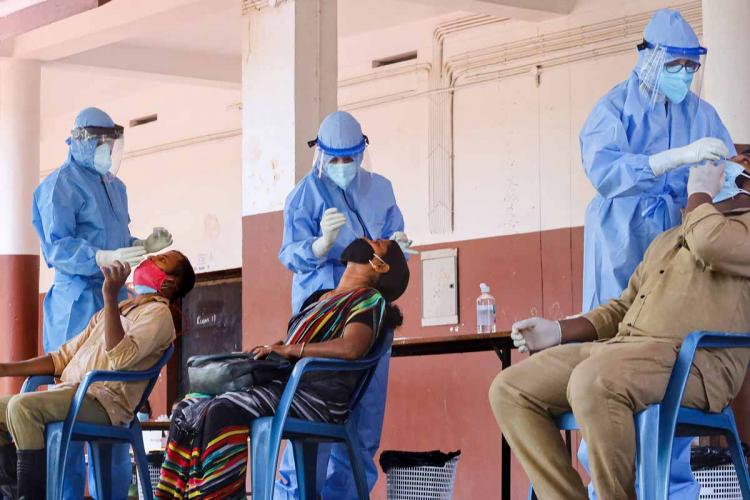
Omicron seen in 38 nations, but Delta is still dominant: WHO
Govts need to take action against Delta, which will benefit the fight against Omicron, say top officials of global body

Pointing out that the Omicron is more contagious than the Delta, the World Health Organization has said the former variant of COVID has been detected in 38 countries, against 23 in the middle of last week.
“We do see an increasing growth rate, we see increasing numbers of Omicron being detected,” said Dr Maria Van Kerkhove, the WHO’s COVID technical lead, at a livestreamed Q&A session late last week. “But we have reports of Omicron in 38 countries in all six WHO regions.”
Either we are in this together or we are not. The way out of this is together.
Governments need to take action against delta, which will benefit omicron. Please act now. #COVID19 @WHO https://t.co/gK0hIRu5Mr
— Maria Van Kerkhove (@mvankerkhove) December 4, 2021
Delta remains the dominant SARS-CoV-2 variant worldwide, emphasised Van Kerkhove. However, the Omicron may prove to be more transmissible than the Delta, she added. “There is a suggestion that there is increased transmissibility; what we need to understand is if it’s more or less transmissible compared to Delta,” she said.
Also read: Strict compliance, booster shots – Centre’s strategy to deal with Omicron
The need of the hour is concerted action, said Van Kerkhove, an infectious disease epidemiologist. “We need to somehow figure out that all of us are either in this together or we’re not. You cannot have a pandemic in one part of the world and not in others. And, for the record, we’re very much in the middle of this pandemic.”
No room for surprises
Whether or not it is quicker, Omicron’s transmission is certainly different from the earlier recorded variants, said Dr Mike Ryan, Executive Director of the WHO’s Health Emergencies Program. “Clearly, the virus does appear to be transmitting efficiently,” he observed. “And, we saw that before with Delta. So again, there’s certain things we shouldn’t be surprised with.”
Omicron displays around 30 spike protein mutations, which may help it attack human cells faster and also evade immunity mechanisms.
On Sunday, India recorded its fifth Omicron case — a 37-year-old man who arrived in Delhi from Tanzania tested positive. He was admitted to the Lok Nayak Jai Prakash Hospital (LNJP). The first two cases were recorded in Bengaluru, and the subsequent ones in Maharashtra and Gujarat.
Also read: Will high seroprevalence help Indians? What experts say
Severity of cases and reporting bias
The WHO officials said detailed data and evidence on the severity of Omicron are yet to emerge, and that it will probably take a few weeks. Till date, there has been no reported instance of severe sickness or mortality due to Omicron. South Africa, the first to inform the world of the new variant, has seen increased hospitalisations, but no deaths.
However, said Ryan, with the Alpha and Delta variants, too, only mild cases were reported to start with. It typically takes around two weeks to see increased mortality due to potent variants. “It takes time unfortunately,” Ryan said. “We saw that as well in previous waves of this pandemic. When the incidence rate goes up, it takes a week or two for that to result in hospital admissions and deaths.”
Also, as Van Kerkhove pointed out, some of the first identified Omicron cases were in a cluster of university students in South Africa. Their young age and healthy constitutions may have led to the mild symptoms.
Further, said the epidemiologist, there could be a reporting bias clouding data on the severity of the variant. Right now, only air travellers have been substantially tested for Omicron; since they are mostly healthy individuals (fit enough to travel), their symptoms may not be very severe.
“If you’re traveling, you’re not sick or you shouldn’t be traveling if you’re sick,” Van Kerkhove said. “So, there’s a bias in terms of what is being detected at the moment, but that will change over time.”
“There were initial reports that it tended to be milder, but it’s really too soon,” she said. “Everybody who is infected with SARS-CoV-2 regardless of what variant will always start out with a mild disease. And so maybe it will stop there with mild, some people are asymptomatic of course, but it may stop with mild disease or it may take some time.”
Research and sharing info, going forward
Calling on nations to fight the virus together, Van Kerkhove said genetic sequencing of COVID cases should be increased so that variants are spotted early on. Further, the knowledge should be widely shared, she added.
“Now is the time to beef up the systems,” she said. “You’ve heard us say that for quite some time now, but it’s not too late to do this — systems need to be reinforced.”
Both Van Kerkhove and Ryan said vaccination remains the best weapon against COVID. There’s a ‘clear relationship’ between vaccine inequity and the onset of variants, said the latter.
“The trajectory of the pandemic is in our hands. It has always been in our hands. What happens now & into 2022 is up to us,” Van Kerkhove had tweeted earlier. “Collectively, we can end the #COVID19 pandemic through action. It’s up to all of us. We can save lives now. We must.”


